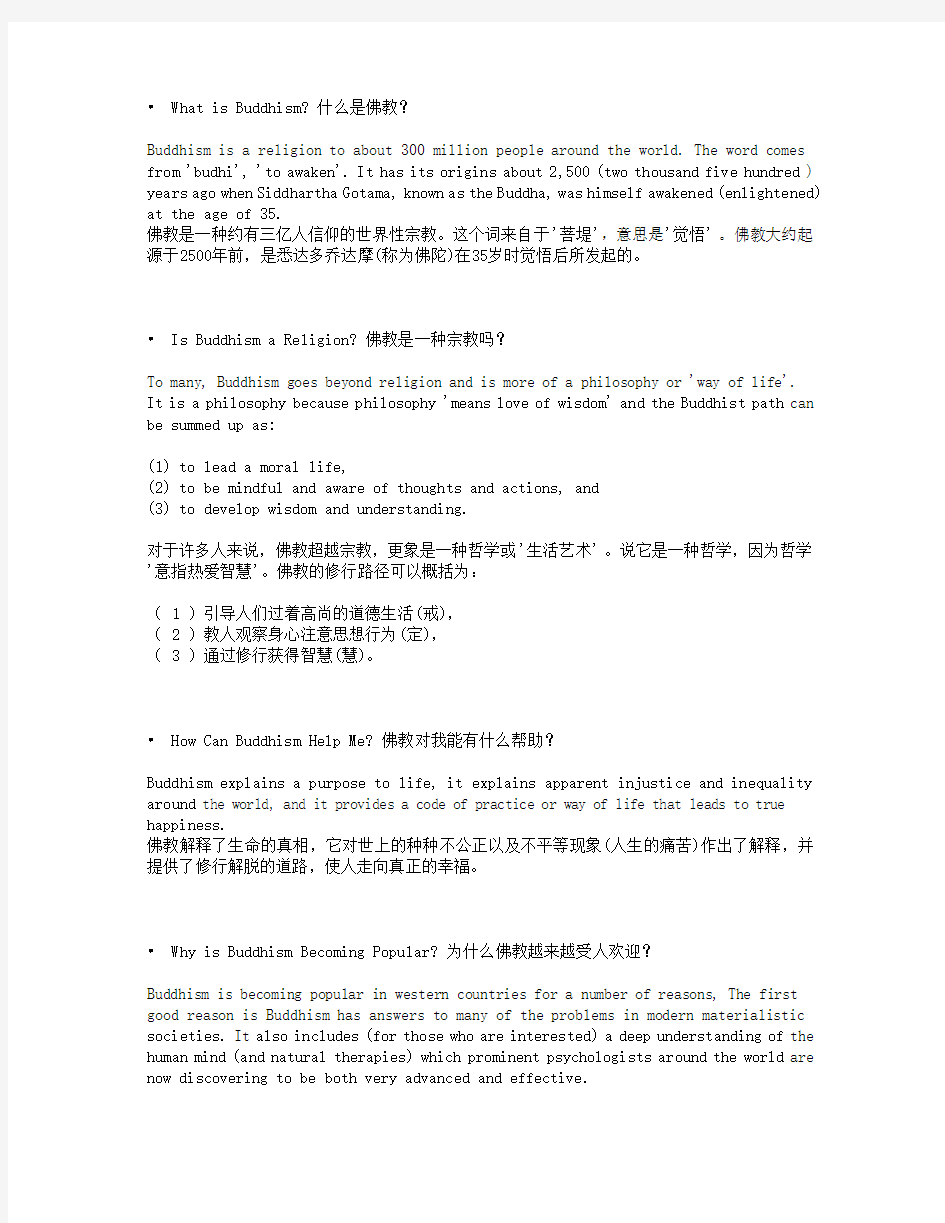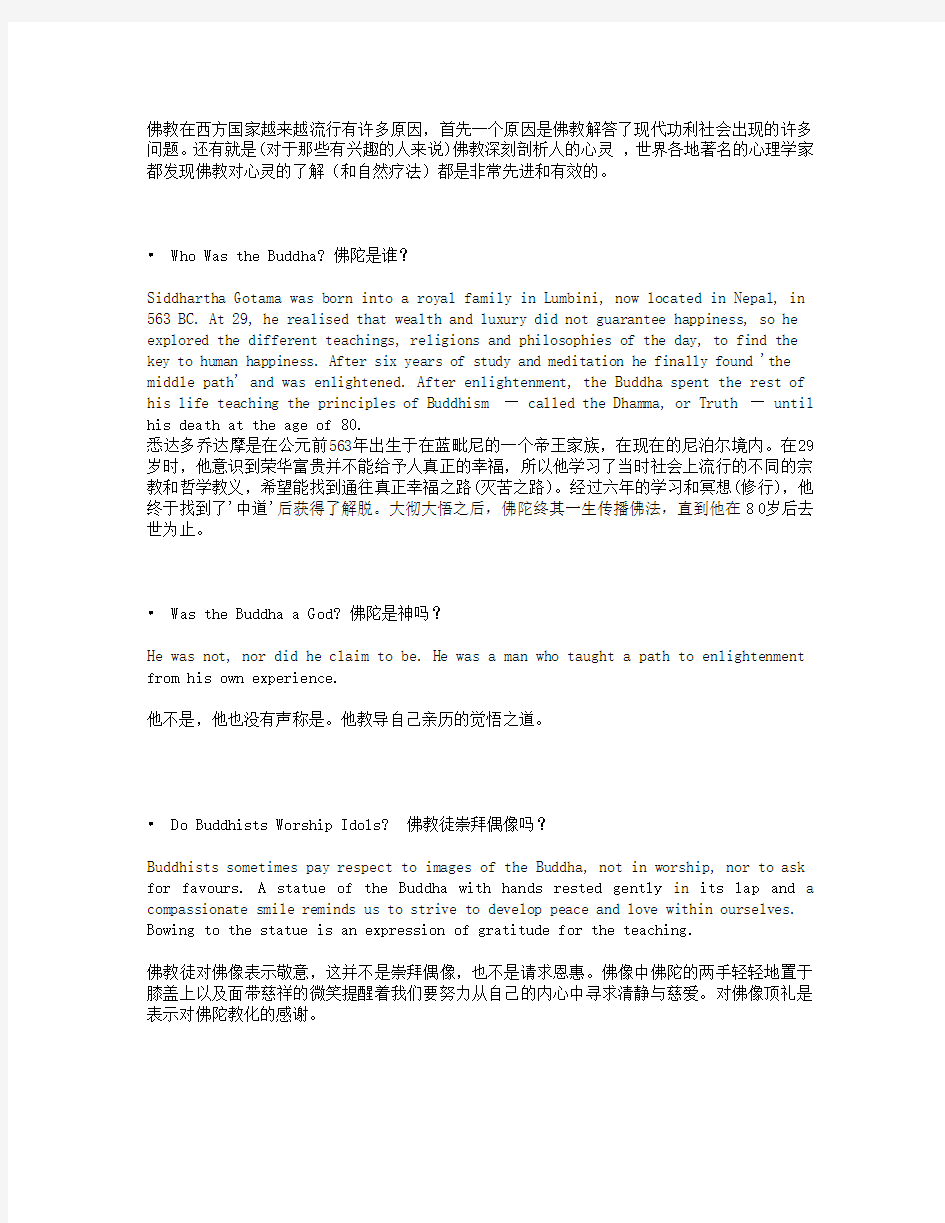

? What is Buddhism? 什么是佛教?
Buddhism is a religion to about 300 million people around the world. The word comes from 'budhi', 'to awaken'. It has its origins about 2,500 (two thousand five hundred ) years ago when Siddhartha Gotama, known as the Buddha, was himself awakened (enlightened) at the age of 35.
佛教是一种约有三亿人信仰的世界性宗教。这个词来自于'菩堤',意思是'觉悟' 。佛教大约起源于2500年前,是悉达多乔达摩(称为佛陀)在35岁时觉悟后所发起的。
? Is Buddhism a Religion? 佛教是一种宗教吗?
To many, Buddhism goes beyond religion and is more of a philosophy or 'way of life'. It is a philosophy because philosophy 'means love of wisdom' and the Buddhist path can be summed up as:
(1) to lead a moral life,
(2) to be mindful and aware of thoughts and actions, and
(3) to develop wisdom and understanding.
对于许多人来说,佛教超越宗教,更象是一种哲学或'生活艺术' 。说它是一种哲学,因为哲学'意指热爱智慧'。佛教的修行路径可以概括为:
( 1 )引导人们过着高尚的道德生活(戒),
( 2 )教人观察身心注意思想行为(定),
( 3 )通过修行获得智慧(慧)。
? How Can Buddhism Help Me? 佛教对我能有什么帮助?
Buddhism explains a purpose to life, it explains apparent injustice and inequality around the world, and it provides a code of practice or way of life that leads to true happiness.
佛教解释了生命的真相,它对世上的种种不公正以及不平等现象(人生的痛苦)作出了解释,并提供了修行解脱的道路,使人走向真正的幸福。
? Why is Buddhism Becoming Popular? 为什么佛教越来越受人欢迎?
Buddhism is becoming popular in western countries for a number of reasons, The first good reason is Buddhism has answers to many of the problems in modern materialistic societies. It also includes (for those who are interested) a deep understanding of the human mind (and natural therapies) which prominent psychologists around the world are now discovering to be both very advanced and effective.
佛教在西方国家越来越流行有许多原因,首先一个原因是佛教解答了现代功利社会出现的许多问题。还有就是(对于那些有兴趣的人来说)佛教深刻剖析人的心灵,世界各地著名的心理学家都发现佛教对心灵的了解(和自然疗法)都是非常先进和有效的。
? Who Was the Buddha? 佛陀是谁?
Siddhartha Gotama was born into a royal family in Lumbini, now located in Nepal, in 563 BC. At 29, he realised that wealth and luxury did not guarantee happiness, so he explored the different teachings, religions and philosophies of the day, to find the key to human happiness. After six years of study and meditation he finally found 'the middle path' and was enlightened. After enlightenment, the Buddha spent the rest of his life teaching the principles of Buddhism — called the Dhamma, or Truth — until his death at the age of 80.
悉达多乔达摩是在公元前563年出生于在蓝毗尼的一个帝王家族,在现在的尼泊尔境内。在29岁时,他意识到荣华富贵并不能给予人真正的幸福,所以他学习了当时社会上流行的不同的宗教和哲学教义,希望能找到通往真正幸福之路(灭苦之路)。经过六年的学习和冥想(修行),他终于找到了'中道'后获得了解脱。大彻大悟之后,佛陀终其一生传播佛法,直到他在8 0岁后去世为止。
? Was the Buddha a God? 佛陀是神吗?
He was not, nor did he claim to be. He was a man who taught a path to enlightenment from his own experience.
他不是,他也没有声称是。他教导自己亲历的觉悟之道。
? Do Buddhists Worship Idols? 佛教徒崇拜偶像吗?
Buddhists sometimes pay respect to images of the Buddha, not in worship, nor to ask for favours. A statue of the Buddha with hands rested gently in its lap and a compassionate smile reminds us to strive to develop peace and love within ourselves. Bowing to the statue is an expression of gratitude for the teaching.
佛教徒对佛像表示敬意,这并不是崇拜偶像,也不是请求恩惠。佛像中佛陀的两手轻轻地置于膝盖上以及面带慈祥的微笑提醒着我们要努力从自己的内心中寻求清静与慈爱。对佛像顶礼是表示对佛陀教化的感谢。
? Why are so Many Buddhist Countries Poor? 为什么那么多信仰佛教的国家贫穷?
One of the Buddhist teachings is that wealth does not guarantee happiness and also wealth is impermanent. The people of every country suffer whether rich or poor, but those who understand Buddhist teachings can find true happiness.
佛教的一个教义是:财富并不能保证真正的幸福并且财富也是无常的。每个国家的人读都有苦,无论贫穷与富贵,只有那些修行了悟佛法的人才能找到真正的幸福(才能断苦)。
? Are There Different Types of Buddhism? 有不同类型的佛教吗?
There are many different types of Buddhism, because the emphasis changes from country to country due to customs and culture. What does not vary is the essence of the teaching — the Dhamma or truth.
由于各个国家不同的习俗和文化而产生了不同类型的佛教,但佛法的本质也就是佛教所说的真理是没有变的。
? Are Other Religions Wrong? 其他宗教都是错误的吗?
Buddhism is also a belief system which is tolerant of all other beliefs or religions. Buddhism agrees with the moral teachings of other religions but Buddhism goes further by providing a long term purpose within our existence, through wisdom and true understanding. Real Buddhism is very tolerant and not concerned with labels like 'Christian', 'Moslem', 'Hindu' or 'Buddhist'; that is why there have never been any wars fought in the name of Buddhism. That is why Buddhists do not preach and try to convert, only explain if an explanation is sought.
佛教也是一种信仰,它对其它的信仰或宗教是很宽容的。佛教赞同其他宗教关于道德的教义,但佛教依于智慧和真知进一步指出人生更长远的目标。真正的佛教是非常宽容的,并不执着于比如对'基督教'、'穆斯林'、'印度教'或'佛教' 等名称的分别。这就是为什么在历史上从来没有任何战争是以佛教的名义发起的。佛教徒也从不强求别人改变信仰,只是在别人需要时尽力开导。
? Is Buddhism Scientific? 佛教合乎科学吗?
Science is knowledge which can be made into a system, which depends upon seeing and testing facts and stating general natural laws. The core of Buddhism fit into this definition, because the Four Noble truths (see below) can be tested and proven by anyone. In fact, the Buddha himself asked his followers to test the teaching rather than accept his word as true. Buddhism depends more on understanding than faith.
科学是可以形成系统的知识,是通过观察和试验的结果来说明一般的自然法则。佛教从总体上来说也符合这种方式,因为佛法的四圣谛(见下文)是可以通过检验和求证的。事实上,佛陀本人也要求他的追随者自己去修行证悟他的教法,而不是盲目地接受他的话。佛教更重视理解(智慧)而不是仅仅依赖于信仰。
? What did the Buddha Teach? 佛陀的教导是什么?
The Buddha taught many things, but the basic concepts in Buddhism can be summed up by the Four Noble Truths and the Noble Eightfold Path.
佛陀对人们有很多的教导,但基本的教义可以概括为四圣谛与八圣道。
? What is the First Noble Truth? 第一个圣谛(苦谛)是什么?
The first truth is that life is suffering i.e., life includes pain, getting old, disease, and ultimately death. We also endure psychological suffering like loneliness, frustration, fear, embarrassment, disappointment and anger. This is an irrefutable fact that cannot be denied. It is realistic rather than pessimistic because pessimism is expecting things to be bad. lnstead, Buddhism explains how suffering can be avoided and how we can be truly happy.
第一个圣谛是人生是有种种痛苦的,就是说人生之苦包括疼痛,老化,生病,以及最终死亡。我们还得忍受心理上的痛苦比如孤独,沮丧,恐惧,尴尬,失望和愤怒。这是一个无可辩驳的事实也是不能否认的。这是面对现实而不是悲观,因为悲观主义是预期一切都是不好的。但佛教解释了如何摆脱痛苦以及如何使我们获得真正的快乐。
? What is the Second Noble Truth? 第二个圣谛(集谛)是什么?
The second truth is that suffering is caused by craving and aversion. We will suffer if we expect other people to conform to our expectation, if we want others to like us, if we do not get something we want,etc. In other words, getting what you want does not guarantee happiness. Rather than constantly struggling to get what you want, try to modify your wanting. Wanting deprives us of contentment and happiness. A lifetime of wanting and craving and especially the craving to continue to exist, creates a powerful energy which causes the individual to be born. So craving leads to physical suffering because it causes us to be reborn.
第二个圣谛讲痛苦的原因是渴求和厌恶(贪与嗔)。如果我们期望别人顺从自己的意愿、如果我们希望别人喜欢我们、如果我们没有得到我们想要的东西,发生如此等等的事就会感到痛苦。换言之,得到你想要的并不能保证使你真正幸福。不断地挣扎得到你所希望的,不如尝试放下渴求。不停地渴求只会使我们失去知足与快乐。如果一辈子不停地渴求尤其是渴求继续存在,
就会造成了强大的能量从而导致再生。所以渴求导致身心痛苦,因为它使我们转生。
? What is the Third Noble Truth? 第三个圣谛(灭谛)是什么?
The third truth is that suffering can be overcome and happiness can be attained; that true happiness and contentment are possible. lf we give up useless craving and learn to live each day at a time (not dwelling in the past or the imagined future) then we can become happy and free. We then have more time and energy to help others. This is Nirvana.
第三个圣谛是离苦得乐是可以实现的,真正的快乐和满足是可能获得的。假如我们放弃无用的渴求和学习每天生活在当下(而不是停留在过去的忆念中或对将来的想象中),那么我们就会感到快乐与自由。我们还会有更多的时间和精力来帮助别人。这就是涅槃(解脱)。
? What is the Fourth Noble Truth? 第四个圣谛(道谛)是什么?
The fourth truth is that the Noble 8-fold Path is the path which leads to the end of suffering.
第四个圣谛是八圣道可以使人彻底脱离痛苦。
? What is the Noble 8-Fold Path? 什么是八正道?
In summary, the Noble 8-fold Path is being moral (through what we say, do and our livelihood), focussing the mind on being fully aware of our thoughts and actions, and developing wisdom by understanding the Four Noble Truths and by developing compassion for others.
总的来说八正道就是在说话做事及工作谋生上注意守戒(端正品行) ,用心观察我们的思想及行动(修定),并且从体悟四圣谛中获得智慧以及培养对人的慈悲心。
? What are the 5 Precepts? 五戒是什么?
The moral code within Buddhism is the precepts, of which the main five are: not to take the life of anything living, not to take anything not freely given, to abstain from sexual misconduct and sensual overindulgence, to refrain from untrue speech, and to avoid intoxication, that is, losing mindfulness.
佛教的道德规则是戒律,其中主要的五戒是:不杀生,不偷盗,不邪淫及放纵感官享乐,不妄
语,不饮酒或吸毒而使人失去正念。
? What is Karma? 什么是因果报应?
Karma is the law that every cause has an effect, i.e., our actions have results. This simple law explains a number of things: inequality in the world, why some are born handicapped and some gifted, why some live only a short life. Karma underlines the importance of all individuals being responsible for their past and present actions. How can we test the karmic effect of our actions? The answer is summed up by looking at (1) the intention behind the action, (2) effects of the action on oneself, and (3) the effects on others.
因果报应是说有因必有果,也就是说,我们的一切行为都有结果。这个简单的定律可以解释很多事情:世界的不平等现象,为什么有些人一出生就残废和而有些人却有天赋,为什么有些人短命。因果报应强调所有的人必须对他们自己的过去与现在行为负责。怎么评判我们行动所造成的果报如何呢?概括地说答案是要看( 1 )行为的意图,( 2 )行为结果对自己的影响,和( 3 )对别人的影响等。
? What is Wisdom? 什么是智慧?
Buddhism teaches that wisdom should be developed with compassion. At one extreme, you could be a goodhearted fool and at the other extreme, you could attain knowledge without any emotion. Buddhism uses the middle path to develop both. The highest wisdom is seeing that in reality, all phenomena are incomplete, impermanent and do no constitute a fixed entity. True wisdom is not simply believing what we are told but instead experiencing and understanding truth and reality. Wisdom requires an open, objective, unbigoted mind. The Buddhist path requires courage, patience, flexibility and intelligence.
佛法教导我们智慧与慈悲要同时开发。在一个极端,你可能是个傻好人,在另一个极端,你可能只获得知识却没有任何情感。佛教使用中道来开发慈悲与智慧。最高的智慧是看到万法无常无我的真相。真正的智慧不只是相信教义而是实践和了悟真相。开发智慧需要一个开放的、客观的、不固执的头脑。在修行佛法的道路上需要勇气、耐心、随缘和智慧。
? What is Compassion? 什么是慈悲?
Compassion includes qualities of sharing, readiness to give comfort, sympathy, concern, and caring. In Buddhism, we can really understand others, when we can really understand ourselves through wisdom.
慈悲心的特质包括的愿与别人分享、随时愿意给人安乐、有同情心、关心别人以及照顾别人。根据佛教,如果我们能通过智慧了解自己,我们才能真正理解别人。
? How do I Become a Buddhist? 如何成为一个佛教徒?
Buddhist teachings can be understood and tested by anyone. Buddhism teaches that the solutions to our problems are within ourselves not outside. The Buddha asked all his followers not to take his word as true, but rather to test the teachings for themselves. ln this way, each person decides for themselves and takes responsibility for their own actions and understanding. This makes Buddhism less of a fixed package of beliefs which is to be accepted in its entirety, and more of a teaching which each person learns and uses in their own way.
佛教的教义是每个人都可以理解并实践的。佛法教导我们消除烦恼是从内心而不是从外面。佛陀要求他的弟子们不要盲目地接受他的话而是要自己去修行证悟他的教法。这样,每个人都可以为他们自己作出选择但也得对他们自己的思想行为负责。这样佛教就不会被人们当成固定信仰来全盘接受,而是让人们随着自己的因缘来学习以及利用。
https://www.doczj.com/doc/d6477584.html,